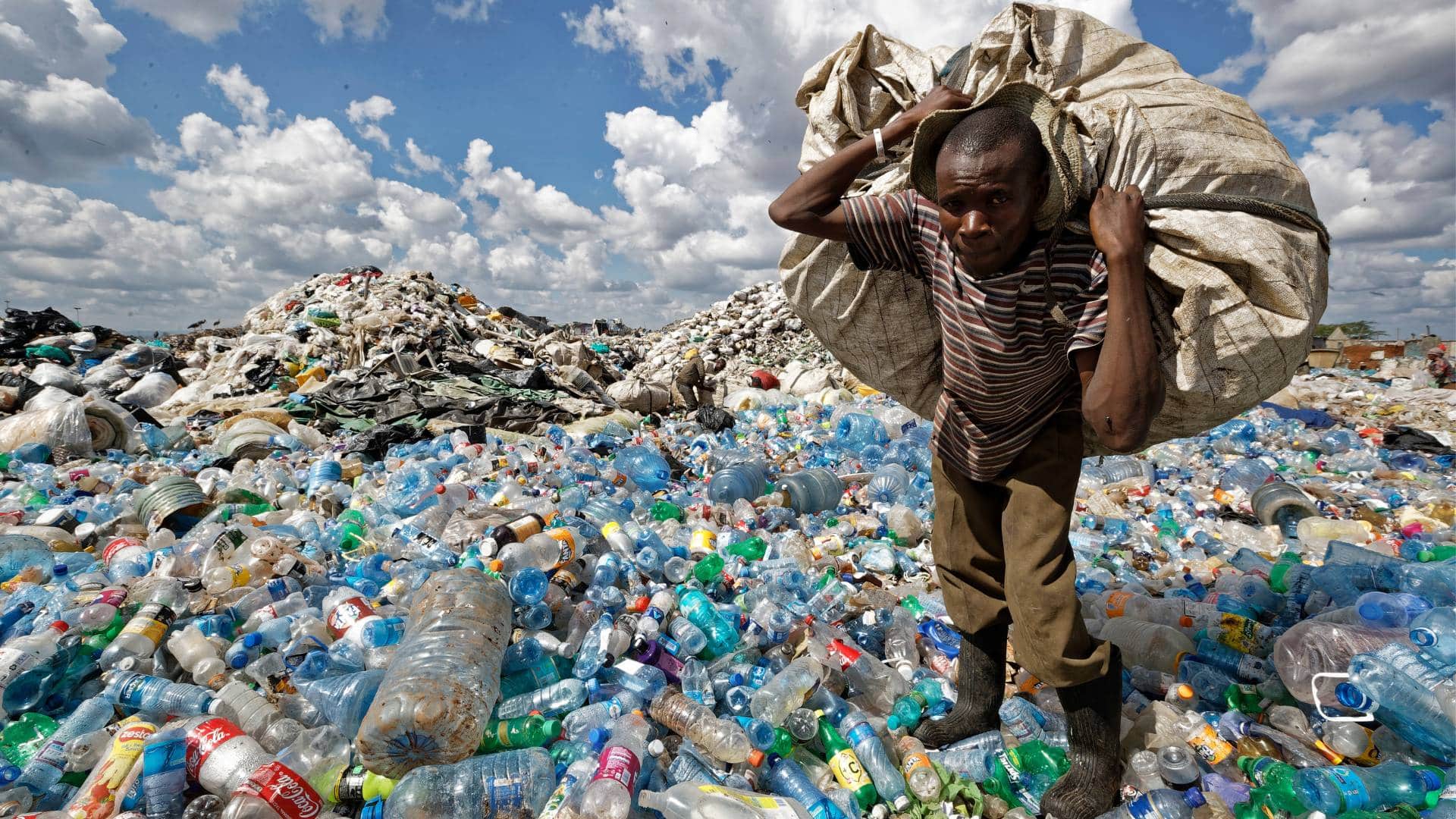Making sure wealthy countries can’t dump their plastic waste on poor nations is important. But how can we stop producing it in the first place?

A man walks on a mountain of plastic bottles as he carries a sack of them to be sold for recycling after weighing them at the dump in the Dandora slum of Nairobi, Kenya on 5 December 2018. (AP Photo/Ben Curtis, File)
“Big Oil Is in Trouble. Its Plan: Flood Africa With Plastic,” a headline in The New York Times read in 2020.
The “trouble” the Times referred to was the decline of fossil fuels amid the climate crisis. “Big Oil” referenced the lobby group the American Chemistry Council (ACC), which includes the likes of Exxon, Dow, Shell, Dupont and Total. As the industry ramps up plastic production to make up for lost profits, the plan was to find somewhere to dump all the waste.
Its solution was to infiltrate the United States’ first bilateral trade agreement with a sub-Saharan African country — Kenya, where plastic bags are banned — and pressure it to ease its stance and become a hub for petrochemicals and their byproducts, aka plastics.
“This is not an African problem,” said Gerance Mutwol, a Nairobi-based plastics campaigner at the environmental group Greenpeace. He linked the ACC’s attempt on Kenya with other recent acts of waste colonialism.
In 2021, the United Kingdom was found dumping and burning waste that was supposed to be recycled in Turkey and illegally surpassing its limits on shipments to Malaysia. The same year, a German shipping giant was caught trying to smuggle 25 tons of plastic waste into Senegal. And last year, mountains of packaging from Amazon in the United States and Canada were found in India’s illegal dumpsites.
“Countries in the Global North scramble to dump plastics in the Global South and use Africa as a dumpster,” said Hellen Kahaso Dena, the Nairobi-based Pan-African Plastics Project lead for Greenpeace.
In November, leading up to the 28th United Nations Conference of the Parties, COP28, delegates met at the UNEP Headquarters in Nairobi for INC3, the Intergovernmental Negotiating Committee’s third round of talks for the world’s first treaty to solely address plastics.
Nevertheless, throughout the session clashes with lobbyists, from and beyond the ACC, stalled talks. Now, as delegates prepare for INC4 in April 2024, a question remains: is the Global Plastics Treaty capable of addressing the evidence of waste colonialism?
“It can and it should,” Kahaso said. “You know, sometimes it just takes political will.”
Why is a treaty necessary?
In 1989, world leaders negotiated the Basel Convention intended to combat the “toxic trade” of waste as rich nations’ trash piled up in Eastern Europe and the developing world. The convention helped control waste dumping and even limited waste trading to solely recyclable, reusable or repurposable items. However, it has been slow to evolve with time and finally, in 2019, Basel was amended to become the only global, legally binding instrument to address plastic waste and pollution.
However, as all environmental activists interviewed for this article explained, the Plastics Treaty is needed to fill Basel’s “loopholes” which are especially apparent in what is even considered waste.
If it’s clothing, it’s second-hand donations, not textile waste. If it can be reused, repaired, have its resources mined or burned for fuel, it’s an asset for the circular economy. And if it’s an ancient computer, a new-age cell phone or a bygone floppy disk, it’s a commodity, not e-waste.
“You can’t say [it’s] technology-for-transfer to a city like Accra [in Ghana] or in Nigeria, and there’s nothing that’s working, you know?” Kahaso said. There needs to be checks and balances and stronger policies from African countries to keep Western governments from dumping plastic waste, she said.
Even in some cases, clear-as-day waste is justified for infrastructure development. As the ACC rationalized in a letter in 2020, if Kenya and the United States allowed unlimited plastic production and waste trade, it would support a global need to develop infrastructure “to collect, sort, recycle and process used plastics, particularly in developing countries such as Kenya.”
In neater terms, the ACC suggested that countries like Kenya need American trash to learn to recycle.
It’s important to note that while the U.S. Senate agreed to ratify the Basel Convention in 1992, and despite more recent nationwide pressure from NGOs, the United States is the only industrialized nation to have not ratified the agreement. This is because, as the U.S. Environmental Protection Agency (EPA) explains, American law does not give domestic agencies the power the EPA needs to hold American companies accountable. By leaving the enforcement up to countries, Basel is a “soft law,” meaning that while it is illegal for Basel signatories to accept, American traders found shipping their waste cannot be prosecuted.
The attempts by the plastics industry to pressure African countries to accept more plastics waste was a wakeup call for Patricia Kombo, best known for her youth climate change advocacy, tree-planting PaTree Initiative and climate education projects.
“It brought me into big shock,” Kombo said. “I realized that there was a lot of talk on adaptation for Africa. I realized there was something bigger.”
That bigger thing to Kombo was plastic. Thus, she was one of the many activists — from Kenya’s youth network, Greenpeace Africa and those at the Centre for Environment Justice and Development in Kenya — whose conversations with the government played a role in pushing back the chemical lobby’s pressure.
But for Kombo, her plastic activism didn’t end there.
The health hazards of plastic waste
Kombo’s research, currently at the University of Nairobi, pivoted from waste management to looking at the way plastics’ chemicals affect our health.
Pointing to several studies — one from the International Pollutants Elimination Network that showed plastics’ effects on fertility, her own that showed its effect on sperm counts, another from Kenya’s CEJAD that showed its penetration into Kenya’s food chain and those that look at its effect on waste pickers — she came to a blunt conclusion: “It is so unfair because we are not the leading plastic producers,” Kombo said. “We do not produce these plastics, but the impact is actually high on us in terms of health and also in terms of the environment.”
Imagine eating an egg and being exposed to a dose of toxic chemicals that exceed the European Union’s safety limit by 250 days.
Those are the results of CEJAD’s study. Similar toxicity levels were found in toys, hair accessories, office supplies and kitchen utensils bought in Kenya’s markets, all affected by what the researchers call the “unregulated recycling of e-waste plastics.”
These plastics contain PCBs, carcinogenic polymers, that when released via dumping, incineration or recycling, can disrupt immune, reproductive, nervous and endocrine systems. When an unfair amount of waste comes from overseas, an unfair amount of PBCs come with it. IPEN reported similar findings in 11 other African and Arab nations — a region the organization reports only produces 7% of the world’s plastics.
Aron Kecha is a sustainability scientist, urban planner and technical advisor for CEJAD. What he found most surprising about the study was how harmful everyday products can be.
“Some of the things you use on a day-to-day basis contain chemicals that are dangerous, especially things like toys which are used by children,” Kecha said.
Kombo said that women who live near dump sites interviewed for a study in Dandora, Kenya reported issues with their menstrual cycles.
“You know the shocking part is some of these chemicals are passed to newborns during breastfeeding,” she added. “So, it’s a generation of kids with contaminated chemicals in their bodies.”
Kombo said the treaty needs to provide for a “just transition” to ensure that dump sites aren’t recycling contaminated plastics in the name of sustainability. To her, the treaty is integral to reinforcing Kenya’s ban, weakened by plastic smuggling by neighboring countries, regulating the movement of plastic waste between borders and ensuring transparency in the contents of the plastic.
What’s next?
The goal of reducing plastic waste is complicated by the continual increase in plastics production. In just the last two decades, global plastic production has doubled and by 2040, it’s projected to double again.
“As the world moves toward renewable energy, the only place where the petrochemical industries can anchor themselves is on plastics,” Mutwol said. “Pollution is not a waste management problem. Plastic pollution is a production problem. We have production diarrhea, that’s how I usually put it.”
At INC3 in November 2023, small island nations and African countries worked hard to ensure that stipulations concerning polymers remained in the treaty’s draft, Mutwol said.
If there’s one thing Kombo wants the West to understand, it’s that Kenya does not have the infrastructure for mass recycling and that even when recycled, plastics still emit hazardous chemicals from the PCB polymers.
She also wants it to be understood that when, alternatively, plastics are burned and used as fuel — like the ACC suggested, and as one dumpsite investigated by CEJAD does — the same health hazards persist, outweighing the benefits of circularity.
Including provisions for hazardous chemicals that can be rereleased was discussed by treaty negotiators. Kecha said it comes down to how well potential policies are implemented on the country level.
“It’s a step in the right direction,” Kecha said, referring to the UN talks. “But basically at the end of the day, it’s just a legal document that people find loopholes to exploit, the way they’ve been finding them in the Basel Convention.”
There are three things all member states agree on: the need for waste management, a “just transition” and a financial mechanism to achieve its objectives.
Amid INC3, the EU passed a rule to ban exports of waste plastic to poor countries by 2026. But a strong treaty will be needed to hold them accountable. Kahaso said that instead of Basel’s “soft law” approach, countries should not have a choice over whether they implement the treaty’s final requests.
“If it comes to that, it will not be an effective treaty, and that’s why we’re really pushing that it’s legally binding, but it also needs to be a treaty that covers the entire life cycle of plastics,” Kahaso said. “As much as we say ‘let’s focus on waste,’ then it will mean we continue producing. And what does that mean?”
Questions to consider:
- Why do wealthy nations seek to export their plastic waste?
- What is the biggest challenge in reducing plastic waste?
- What are three things you can do to reduce the amount of plastic you use?

Miquéla Thornton is a Master’s candidate and David Maraniss Fellow at the University of Wisconsin-Madison School of Journalism and Mass Communication and a recent graduate from Vanderbilt University. She enjoys writing about environmental justice, climate change and solutions to the crisis and currently writes about climate technologies for Robert Downey Jr.’s FootPrint Coalition.
Read more News Decoder stories about consumer products and the environment:

Wonderful article, Miquéla! I learned so much.
Very interesting articles, It gives me more knowledge about new things to develop my skills in writing news. Thanks a lot and more power!!!